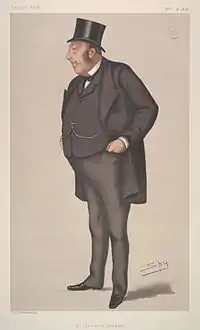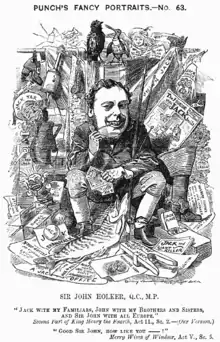John Holker
Sir John Holker QC (1828 – 24 May 1882) was a British lawyer and politician. He sat as a Member of Parliament (MP) for Preston from 1872 until his death ten years later. He was first Solicitor General and later Attorney General in the second government of Benjamin Disraeli.


He was born in Bury, Lancashire and educated at Bury Grammar School. After being articled to a solicitor, he was called to the bar at Gray's Inn in 1854, where he was later a bencher, and treasurer in 1875. He joined the Northern Circuit, and lived in Manchester. He married in 1861 but had no children. After his first wife died, he remarried in 1874 to Miss Mary Lucia Richardson. There were no children from either marriage.
He returned to London in 1864, where he developed a very successful and lucrative legal practice, and was appointed Queen's Counsel in 1866.
He was the Conservative candidate at a by-election in Preston in 1872, one of the first held after the Ballot Act 1872 required the use of a secret ballot. He served as Member of Parliament for Preston until his death in 1882. He became Solicitor General in the government of Benjamin Disraeli in 1874, and was knighted. He replaced Sir Richard Baggallay as Attorney General in 1875, retaining in the position until Liberals won the general election in 1880.
He was appointed a Lord Justice of Appeal in January 1882, but resigned due to ill health in May, and died in London a few days later.
References
- Leigh Rayment's Historical List of MPs
- J. A. Hamilton, ‘Holker, Sir John (1828–1882)’, rev. Hugh Mooney, Oxford Dictionary of National Biography, Oxford University Press, 2004 accessed 29 Aug 2013
External links
| Wikimedia Commons has media related to John Holker. |
| Wikisource has original text related to this article: |
- Hansard 1803–2005: contributions in Parliament by John Holker
| Parliament of the United Kingdom | ||
|---|---|---|
| Preceded by Sir Thomas Hesketh Edward Hermon |
Member of Parliament for Preston 1872–1882 With: Edward Hermon to 1881 William Farrer Ecroyd from 1881 |
Succeeded by William Farrer Ecroyd Henry Cecil Raikes |
| Legal offices | ||
| Preceded by Sir Richard Baggallay |
Solicitor General for England and Wales 1874–1875 |
Succeeded by Sir Hardinge Giffard |
| Preceded by Sir Richard Baggallay |
Attorney General for England and Wales 1875–1880 |
Succeeded by Sir Henry James |